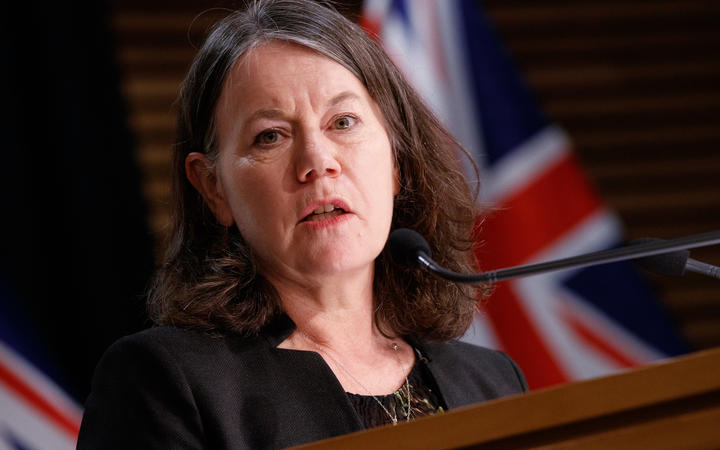By Rowan Quinn, RNZ News health correspondent
Health workers in Aotearoa New Zealand are thanking Director-General of Health Dr Ashley Bloomfield for his work stopping the ailing health system from collapsing in the covid-19 pandemic — and for saving lives.
They say they can relate to him needing a rest.
Dr Bloomfield leaves his job in July, stepping down 12 months early after the huge stress of the past two years.
There are few public servants who have had the same degree of fame.
For two years he has been a regular in the living rooms of the country, particularly in the first lockdown when almost everyone was home turning in every day to hear news of the covid-19 threat.
Emergency doctor and chair of the Council of Medical Colleges Dr John Bonning said Dr Bloomfield had to step up to communicate with the public in a role that would normally have been done by politicians.
He exuded trust and had stellar public health credentials, as a medical doctor who had worked for the World Health Organisation and headed a district health board (DHB), Dr Bonning said.
Engaged and communicated
He engaged and communicated very regularly with health worker groups.
“He felt the pain, he felt the pressure along with the rest of us,” he said.
Frontline GP and chair of the Pacific GP Network Api Talemaitoga said the country was lucky to have a director-general with top public health skills when they were needed most.
That meant Dr Bloomfield understood the practicalities of what had to be done — like limiting numbers, mass masking, vaccination programmes and the importance of communication, he said.
Covid-19 Minister Chris Hipkins said Dr Bloomfield’s advice had been at the heart of the government’s decision making and he “had saved thousands if not tens of thousands of lives”.
But not everything was perfect under his tenure. There was a blunder that meant high-risk border workers were not being routinely tested as promised, criticisms about spread in MIQ facilities, delays at times over testing, and a slow vaccine rollout for Māori.
Delays over Māori health autonomy
Te Whānau O Waiapareira chief executive John Tamihere said the director-general had done a decent job but he was uncomfortable with the “idolatry” that had sprung up around him.
He had called Dr Bloomfield out over the past two years on issues like the delays giving Māori health groups autonomy to look after their communities, and of the ministry’s initial failure to hand over health data.
It would be mean-spirited to criticise Dr Bloomfield on his way out, he said.
He was a highly-paid public servant who had done a decent job, particularly for mainstream New Zealand, but his copybook was not completely clean, Tamihere said.
“But … Dr Bloomfield will go down as leading a great result when compared with other nations,” he said.
Pacific health groups had shared the concerns about not initially being able to lead the response for their communities, who bore the brunt of early waves of the virus.
Privy to the big picture
GP Dr Api Talemaitoga said while that was frustrating, he and his colleagues on the frontline were not always privy to the big picture Dr Bloomfield was dealing with “in terms of the whole country, the ministry, and his political masters”.
Senior emergency doctor Dr Kate Allan represents the College of Emergency Medicine and said Dr Bloomfield inherited a “broken health system” but led a response that stopped it from collapsing under the weight of covid-19.
“I take my hat off to him. I think it’s been an amazing job and an incredibly difficult job and I can’t imagine how tired he must be,” she said.
Dr Bloomfield is, in turn, quick to credit people like Dr Allan who worked on the frontline to battle the virus.
‘Relentless’
The director-general of health was one of three top health chiefs to announce their resignations yesterday.

Director of Public Health Caroline McElnay and Deputy Director of Public Health Niki Stefanogiannis are also leaving the ministry.
Health Minister Andrew Little told RNZ Morning Report they had been at the forefront of the covid-19 response and had worked tirelessly. “As Ashley said to me in the weekend, he is just exhausted.”
Thousands of front line health workers had done a phenomenal job and would be feeling the same after two years of the pandemic, he said.
There was still work to be done in terms of the rebuild and the nationwide health restructure “because we’ve got to create that extra capacity.”
“I am committed to filling the gaps that are there.”
‘Saved thousands of lives’
Epidemiologist Professor Rod Jackson said the key leadership group including Dr Bloomfield, the prime minister, senior ministers and others “saved thousands of lives, it saved our health services”.
“The work that they did over the past couple of years, it’s just relentless.” Jackson said. “I’m amazed that they lasted so long.”
All three were there at the most important stage but it was “a bit worrying” they were leaving. “The next phase is going to be messy, it’s going to be more political.”
However, New Zealand had “fantastic” vaccines and the knowledge on how to slow down and contain a pandemic.
This article is republished under a community partnership agreement with RNZ.
Article by AsiaPacificReport.nz





